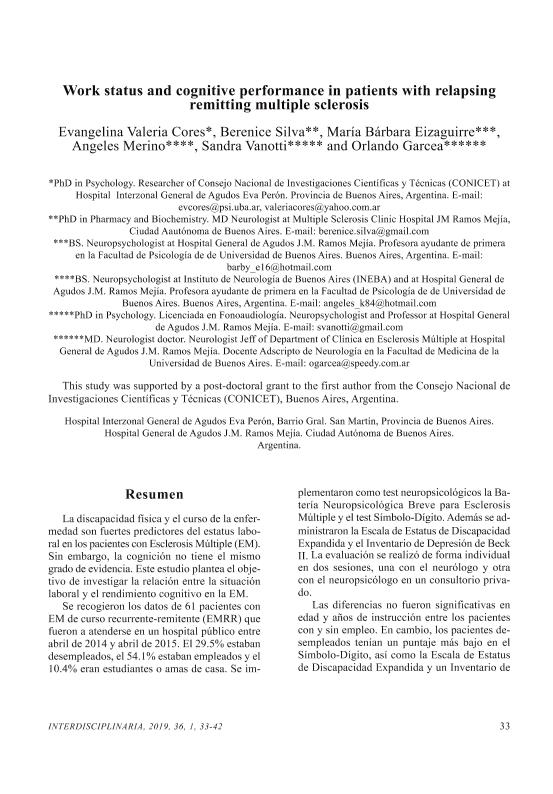Artículo
La discapacidad física y el curso de la enfermedad son fuertes predictores del estatus laboral en los pacientes con Esclerosis Múltiple (EM). Sin embargo, la cognición no tiene el mismo grado de evidencia. Este estudio plantea el objetivo de investigar la relación entre la situación laboral y el rendimiento cognitivo en la EM. Se recogieron los datos de 61 pacientes con EM de curso recurrente-remitente (EMRR) que fueron a atenderse en un hospital público entre abril de 2014 y abril de 2015. El 29.5% estaban desempleados, el 54.1% estaban empleados y el 10.4% eran estudiantes o amas de casa. Se implementaron como test neuropsicológicos la Batería Neuropsicológica Breve para Esclerosis Múltiple y el test Símbolo-Dígito. Además se administraron la Escala de Estatus de Discapacidad Expandida y el Inventario de Depresión de Beck II. La evaluación se realizó de forma individual en dos sesiones, una con el neurólogo y otra con el neuropsicólogo en un consultorio privado. Las diferencias no fueron significativas en edad y años de instrucción entre los pacientes con y sin empleo. En cambio, los pacientes desempleados tenían un puntaje más bajo en el Símbolo-Dígito, así como la Escala de Estatus de Discapacidad Expandida y un Inventario de Depresión de Beck más altos que aquellos con trabajos. Los pacientes con EMRR que estaban desempleados tenían un peor desempeño en la velocidad de procesamiento de la información, más depresión y discapacidad física que aquellos que conservan sus trabajos. Background: Physical disability and disease course are both strong predictors of work status in Multiple Sclerosis (MS) patients, however, cognition does not have the same degree of evidence. This study raises the aim of investigating the relationship between employment status and cognitive performance in MS.Methods: We collected the data of 61 patients with relapsing-remitting MS (RRMS) who had attended consultation between April 2014 and April 2015, in a public hospital. 29.5% were unemployed; 54.1% were employed; and 10.4% were students or housewives. The Brief Repeatable Battery of Neuropsychology Tests; Symbol Digit Modalities Test (SDMT), Expanded Disability Status Scale (EDSS) and Beck Depression Inventory, were administered individually in two sessions, one with a neurologist and one with the neuropsychologist in a private consulting room.Results: Age and years of instruction differences between patients with and without employment were not significant. Unemployed patients had lower SDMT score and higher EDSS and depression, than those with jobs.Conclusions: Patients with RRMS who are unemployed have worse performance in speed of information processing, more depression and physical disability than those who retain their jobs.
Work status and cognitive performance in patients with relapsing remitting multiple sclerosis
Título:
Estatus laboral y rendimiento cognitivo en pacientes con esclerosis múltiple de curso recurrente-remitente
Cores, Evangelina Valeria ; Silva, Berenice Anabel; Eizaguirre, María Bárbara; Merino, Angeles; Vanotti, Sandra Inés; Garcea, Orlando
; Silva, Berenice Anabel; Eizaguirre, María Bárbara; Merino, Angeles; Vanotti, Sandra Inés; Garcea, Orlando
 ; Silva, Berenice Anabel; Eizaguirre, María Bárbara; Merino, Angeles; Vanotti, Sandra Inés; Garcea, Orlando
; Silva, Berenice Anabel; Eizaguirre, María Bárbara; Merino, Angeles; Vanotti, Sandra Inés; Garcea, Orlando
Fecha de publicación:
05/2019
Editorial:
Centro Interamericano de Investigaciones Psicológicas y Ciencias Afines
Revista:
Interdisciplinaria
ISSN:
1668-7027
Idioma:
Inglés
Tipo de recurso:
Artículo publicado
Clasificación temática:
Resumen
Palabras clave:
MULTIPLE SCLEROSIS
,
COGNITION
,
DISABILITY EVALUATION
,
UNEMPLOYMENT
,
ATTENTION
Archivos asociados
Licencia
Identificadores
Colecciones
Articulos(SEDE CENTRAL)
Articulos de SEDE CENTRAL
Articulos de SEDE CENTRAL
Citación
Cores, Evangelina Valeria; Silva, Berenice Anabel; Eizaguirre, María Bárbara; Merino, Angeles; Vanotti, Sandra Inés; et al.; Work status and cognitive performance in patients with relapsing remitting multiple sclerosis; Centro Interamericano de Investigaciones Psicológicas y Ciencias Afines; Interdisciplinaria; 36; 1; 5-2019; 33-42
Compartir



